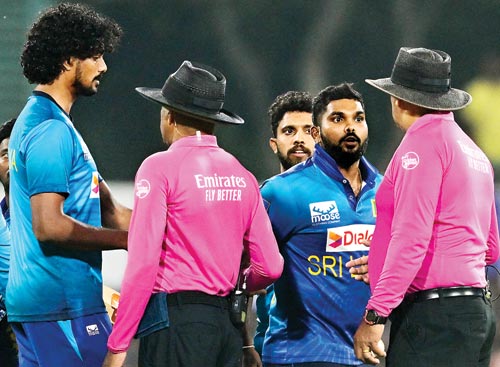Sri Lanka’s cricket, disciplinary issues, bans vs sportsmanship
 The inclusion of Wanindu Hasaranga in the Test squad has raised eyebrows, as his return to the longer format of the game seems sudden and unexpected.
The inclusion of Wanindu Hasaranga in the Test squad has raised eyebrows, as his return to the longer format of the game seems sudden and unexpected.Having previously announced his Test retirement in August 2023 to concentrate on white-ball cricket, Hasaranga’s selection begs the question of what criteria selectors have employed in bringing him back to the fold–other than to complete his recently-imposed playing ban.
With only four wickets to his name in four Tests at an unimpressive average of 100.75, and his last Test appearance dating back to April 2021 against Bangladesh, there were doubts surrounding Hasaranga’s readiness for Test cricket. Compounding these was his absence from first-class cricket in recent months, prompting valid concerns about his match fitness and form.
However, the narrative surrounding his return unveiled a strategic maneuver by Sri Lanka Cricket (SLC), motivated by their desire to have their star bowler and T20 international captain available for the upcoming T20 World Cup in the USA and the West Indies. When it became apparent that Hasaranga faced another ban for misconduct, stemming from an incident of dissent towards an umpire during the third and final ODI against Bangladesh, he was hastily drafted into the Test team.
The suspension, amounting to two Test matches or the equivalent of four ODIs or T20 internationals, was imposed due to Hasaranga accruing eight demerit points, including three from the recent ODI series against Bangladesh. His breach of Article 2.8 of the ICC Code of Conduct, which pertains to showing dissent at an umpire’s decision during an international match, resulted in the sanction. If not for his Test return, he would have missed the first four World Cup games, a death blow to the islanders who has depended on his all-round ability.
The incident occurred during the third ODI against Bangladesh, when Hasaranga displayed frustration by snatching his cap from the umpire in the 37th over of the match. Despite Sri Lanka’s eventual defeat in the game and the series loss to Bangladesh, Hasaranga’s actions earned him a fine of 50 percent of his match fee in addition to the demerit points.
Hasaranga’s disciplinary issues weren’t isolated to this instance, as he had already accumulated five demerit points from a previous transgression during the T20i series against Afghanistan. According to ICC regulations, amassing eight demerit points within a 24-month period translates to a suspension, thus paving the way for his return to Test cricket after serving his ban during the Test series.
During the Afghanistan series in February, Hasaranga was not only involved in an on-field altercation with an umpire but also questioned the umpire’s suitability to do his job at the press conference, raising concerns about his sportsmanship and respect for the game.
According to SLC, Hasaranga had informed them in an email on March 16 of his desire to be considered for Test cricket selection, just two days before the incident and two days before the announcement of the team.
Sri Lanka Cricket’s decision to exploit this loophole in the system, while not inherently wrong, raises broader questions about the organisation’s commitment to maintaining discipline within the national team.
A team that had previously been honoured with back-to-back ICC Spirit of Cricket awards now finds itself grappling with issues of player conduct and sportsmanship.
Sri Lanka ODI skipper Kusal Mendis also copped a 50 per cent fine and three demerit points for a level 2 offence after he ‘abused the umpires while shaking hands with them’ at the end of the third match.
This breached article 2.13 of the Code, which relates to “Personal abuse of a Player, Player Support Personnel, Umpire or Match Referee during an International Match”. This was the first offence for Mendis in a 24-month period.
In contrast to the exemplary conduct exemplified by former captain Mahela Jayawardene, whose leadership contributed to Sri Lanka’s recognition for the Spirit of Cricket award at the ICC awards in 2007 and 2008, the current state of player behaviour leaves much to be desired. There’s a sense of disappointment in the silence of Sri Lanka Cricket in addressing instances of misconduct among its players, particularly those in leadership roles.
It’s imperative that Sri Lanka Cricket takes proactive measures to educate players on the importance of discipline, respect and fair play, both on and off the field. Cricket serves as a platform for nurturing not only athletic prowess but also character development and societal values.
By instilling these principles in players, cricket administrators can ensure that the sport continues to inspire and uplift communities, transcending individual achievements to foster a culture of integrity and sportsmanship.
As stakeholders of the game, it’s incumbent upon Sri Lanka Cricket to uphold the standards set by past luminaries like Mahela Jayawardene and reaffirm its commitment to the Spirit of Cricket. Only through concerted efforts to nurture a culture of respect and discipline can the organisation safeguard the legacy of Sri Lankan cricket and its enduring impact on the global stage.


